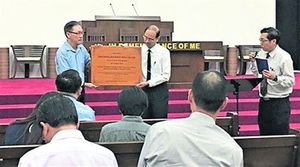Last month we considered the lessons of the Protestant Reformation – reformation yesterday. In this article we see how these lessons can be applied – reformation today and tomorrow.
Reforming mind
If we are to apply the lessons of the Reformation to our present situation, and use them to shape our future, there are certain things that we must cultivate. The first of these is what I call ‘a reforming mind’, that is, a mindset that desires and seeks reformation.
What was it that gave Luther a new heart? It was the truth of Holy Scripture, which showed him that ‘the just shall live by faith’ (Romans 1:17). Salvation belongs to the Lord alone, not to man or his works (Titus 2:10). We need a new spirit to pursue and defend this central truth, and the truth and sufficiency of Scripture generally.

I am convinced that one of the battlefields today is the mind (Philippians 4:8). God has given us a sound mind (2 Timothy 1:7), and we must strive to understand and know what we believe and why we believe it. Emotions must not take centre-stage in our lives; we should strive rather for an understanding of the Scriptures as the bedrock of our profession.
Paul speaks of the ‘renewing of the mind’. Such renewal only comes about as a result of knowing and applying God’s Word, and ‘bringing into captivity every thought to the obedience of Christ’ (Romans 12:1-2; 2 Corinthians 10:5).
Children of the Reformation are single-minded. Their hearts are dominated by love for God, his truth, his cause, his kingdom, and his church. Theirs is a heart of discernment and evangelical obedience to God’s written Word. It is submissive to the will of God and totally reliant on the finished work of Christ.

The reformatory mind is a disciplined, vigilant and diligent mental spirit, that seeks to advance the cause of Christ against all foes. Every Christian today should cultivate an informed and reformed mind.
Reformed family
The Reformation both reformed and transformed the Christian home. With Luther and Katherine von Bora’s marriage (along with Calvin and Idelette, and others also), the Reformers held regular family worship and started catechising their children.
It was unheard of for a priest to have a wife, let alone have children at home. The Reformers blazed the trail, setting up a covenant relationship at home. It was an example for others on how to raise children in the fear and admonition of the Lord. The English Reformers and Puritans taught their children the Bible, the

Lord’s Prayer, the Ten Commandments, and the Shorter Westminster Catechism.
Do we fill our children with the Word and prayer? Or are their minds filled only with the things of the world? Today the family, the most basic building block of our society, is under siege by the adversary. There is an increase in divorce, children are increasingly recalcitrant, and parents grow irresponsible.
The Reformers paid great attention to giving domestic instruction to their children. Families are destroyed by a lack of knowledge of God’s Word. Married couples need to rediscover spiritual fidelity to God first, and then to each other.
Today we need a reformation of the family, from worldly values and earthly pursuits to holiness, godliness and the principles found in God’s Word. Let us heed the advice of Moses in Deuteronomy 6:6-7: ‘these words, which I command thee this day, shall be in thine heart: And thou shalt teach them diligently unto thy children, and shalt talk of them when thou sittest in thine house, and when thou walkest by the way, and when thou liest down, and when thou risest up’.
Let Christian fathers and mothers follow the example of their Reformation forebears, and preserve the sanctity, vitality and harmony of the Christian home (Psalm 127:1). Where there is a Christ-centred home, the fear and worship of God will prosper.
Reformed church
What about the church? The true church is a separated, gospel-preaching and faith-defending Reformed church. It is an assembly of saints that stands firmly on the doctrines of grace taught in the Scriptures and will not compromise or barter it for anything.
It is a redeemed community jealously guarding, protecting and defending the precious tenets of true religion, especially the non-negotiable issues concerning salvation, the authority, sufficiency and perspicuity of God’s Word.
Yet the church is not perfect, and its motto should be ‘reformed yet reforming’. The proliferation of defective versions of the Bible is a matter of grave concern today. Many inaccurate and unreliable versions have arisen, that do not contribute to the proper understanding and interpretation of the Scriptures.
There should be a sense of militancy and urgency for the propagation of sound biblical doctrine, unadulterated with worldly ideas and human philosophies. No New Age teachings, psychology, ecumenism, humanism, modernism, or liberal wisdom, should be allowed to rob us of the truth. The Church of Christ must stand firmly and not waver or compromise in the tumultuous days that surely lie ahead.
We need the gumption and tenacity of the Reformers, to propagate and advance gospel truth without fear and favour of men. Being human, we are vulnerable to deception and falsehood. A vigilant and obedient church is the answer.
Truth is lost by wickedness as well as weakness. The days when men will endure sound teaching and biblical truth are running out, as the return of Christ approaches (Titus 2:13; Revelation 22:12, 20). The Church of Christ must continue steadfast and faithful, contending for the faith once delivered to the saints (Jude 3).
Reformed preaching
The sixteenth-century Reformation was accompanied by strong and uncompromising doctrinal expository preaching of the Word of God. Luther, Calvin, Knox and Zwingli were gifted and eloquent preachers and teachers of the Holy Scriptures. They wasted no time in sharing with the masses what they discovered from the canonical Scriptures, as opposed to traditions and church councils.
Today, we desperately need a return to God-honouring and Christ-centred biblical preaching, without the fear or favour of men, and with power and unction from above. It is worth quoting at length an article by John Robbins of the Trinity Foundation.
‘Biblical preaching is preaching that declares the whole counsel of God and not just snippets from that counsel. Most “evangelical” congregations are starving, living hand to mouth from the crumbs that fall from the pulpits.
‘Neither the preachers nor the congregations suspect that there is a system of doctrine in Scripture, a system so rich and satisfying that no one need starve or go hungry, a system built upon the revelation of Jesus Christ alone, a system that answers all questions, and supplies all needs. “Evangelical” preachers have rejected the idea that the Bible is sufficient, and its corollary, the sufficiency of Christ. They deny that the gospel is the power of God to salvation. They are careless shepherds, betraying the trust of their Lord and their sheep.
‘Many of them are false shepherds, preaching only the doctrines and commandments of men.
‘The power of the Gospel to salvation is implicitly denied and the Gospel itself dishonoured by such ministerial machinations. Psychological manipulation has become the substitute for the power of the Gospel in many churches today.
‘The Gospel is not merely a gate to Christianity; it is the narrow road as well. It is the focus and centre of Christian doctrine and worship. Paul’s determination in preaching must be ours: To know nothing but Jesus Christ and Him crucified’ (The Trinity Review, September 1999).
Malnourished
In many modern churches, the solid, in-depth exposition of the gospel has been replaced by superficial homilies. Preaching is theatrical, melodramatic, entertaining and emotional. Its focus is on personal experience (I remember hearing a message at a Good Friday service, in which the minister talked about his recent mission trip rather than Christ and the atonement).
The congregation is often regaled with the theories and life experiences of men, and with other banter that panders to ‘itching ears’. Worldly advice and psychological tips are passed around from the pulpit, and from the seminaries, as though they were biblical truths. A church devoid of biblical doctrinal preaching is spiritually malnourished, and vulnerable to falsehood and heresies. An informed, knowledgeable and vigilant Christianity is the answer to the seductive heresies and false teachings of today. We must not be content with a superficial acquaintance with the Word but, like the Reformers, strive to be thoroughly grounded and rooted in the most holy faith.


















